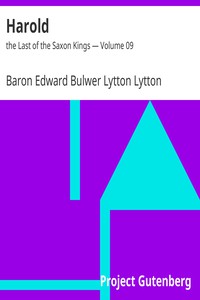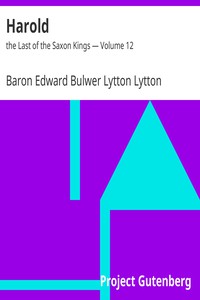Harold : the Last of the Saxon Kings — Complete, Lytton [best e reader for academics .txt] 📗

- Author: Lytton
Book online «Harold : the Last of the Saxon Kings — Complete, Lytton [best e reader for academics .txt] 📗». Author Lytton
“Was-hael,” answered Godrith, draining his hippocras to Vebba’s more potent ale. “Long life to them both! may Edward the Atheling reign, but Harold the Earl rule! Ah, then, indeed, we may sleep without fear of fierce Algar and still fiercer Gryffyth the Walloon—who now, it is true, are stilled for the moment, thanks to Harold—but not more still than the smooth waters in Gwyned, that lie just above the rush of a torrent.”
“So little news hear I,” said Vebba, “and in Kent so little are we plagued with the troubles elsewhere, (for there Harold governs us, and the hawks come not where the eagles hold eyrie!)—that I will thank thee to tell me something about our old Earl for a year 144, Algar the restless, and this Gryffyth the Welch King, so that I may seem a wise man when I go back to my homestead.”
“Why, thou knowest at least that Algar and Harold were ever opposed in the Witan, and hot words thou hast heard pass between them!”
“Marry, yes! But Algar was as little match for Earl Harold in speech as in sword play.”
Now again one of the listeners started, (but it was not the same as the one before,) and muttered an angry exclamation.
“Yet is he a troublesome foe,” said Godrith, who did not hear the sound Vebba had provoked, “and a thorn in the side both of the Earl and of England; and sorrowful for both England and Earl was it, that Harold refused to marry Aldyth, as it is said his father, wise Godwin, counselled and wished.”
“Ah! but I have heard scops and harpers sing pretty songs that Harold loves Edith the Fair, a wondrous proper maiden, they say!”
“It is true; and for the sake of his love, he played ill for his ambition.”
“I like him the better for that,” said the honest Kent man: “why does he not marry the girl at once? she hath broad lands, I know, for they run from the Sussex shore into Kent.”
“But they are cousins five times removed, and the Church forbids the marriage; nevertheless Harold lives only for Edith; they have exchanged the true-lofa 145, and it is whispered that Harold hopes the Atheling, when he comes to be King, will get him the Pope’s dispensation. But to return to Algar; in a day most unlucky he gave his daughter to Gryffyth, the most turbulent sub-king the land ever knew, who, it is said, will not be content till he has won all Wales for himself without homage or service, and the Marches to boot. Some letters between him and Earl Algar, to whom Harold had secured the earldom of the East Angles, were discovered, and in a Witan at Winchester thou wilt doubtless have heard, (for thou didst not, I know, leave thy lands to attend it,) that Algar 146 was outlawed.”
“Oh, yes, these are stale tidings; I heard thus much from a palmer—and then Algar got ships from the Irish, sailed to North Wales, and beat Rolf, the Norman Earl, at Hereford. Oh, yes, I heard that, and,” added the Kent man, laughing, “I was not sorry to hear that my old Earl Algar, since he is a good and true Saxon, beat the cowardly Norman,—more shame to the King for giving a Norman the ward of the Marches!”
“It was a sore defeat to the King and to England,” said Godrith, gravely. “The great Minster of Hereford built by King Athelstan was burned and sacked by the Welch; and the crown itself was in danger, when Harold came up at the head of the Fyrd. Hard is it to tell the distress and the marching and the camping, and the travail, and destruction of men, and also of horses, which the English endured 147 till Harold came; and then luckily came also the good old Leofric, and Bishop Alred the peacemaker, and so strife was patched up—Gryffyth swore oaths of faith to King Edward, and Algar was inlawed; and there for the nonce rests the matter now. But well I ween that Gryffyth will never keep troth with the English, and that no hand less strong than Harold’s can keep in check a spirit as fiery as Algar’s: therefore did I wish that Harold might be King.”
“Well,” quoth the honest Kent man, “I hope, nevertheless, that Algar, will sow his wild oats, and leave the Walloons to grow the hemp for their own halters; for, though he is not of the height of our Harold, he is a true Saxon, and we liked him well enow when he ruled us. And how is our Earl’s brother Tostig esteemed by the Northmen? It must be hard to please those who had Siward of the strong arm for their Earl before.”
“Why, at first, when (at Siward’s death in the wars for young Malcolm) Harold secured to Tostig the Northumbrian earldom, Tostig went by his brother’s counsel, and ruled well and won favour. Of late I hear that the Northmen murmur. Tostig is a man indeed dour and haughty.”
After a few more questions and answers on the news of the day, Vebba rose and said:
“Thanks for thy good fellowship; it is time for me now to be jogging homeward. I left my ceorls and horses on the other side the river, and must go after them. And now forgive me my bluntness, fellow-thegn, but ye young courtiers have plenty of need for your mancuses, and when a plain countryman like me comes sight-seeing, he ought to stand payment; wherefore,” here he took from his belt a great leathern purse, “wherefore, as these outlandish birds and heathenish puddings must be dear fare—”
“How!” said Godrith, reddening, “thinkest thou so meanly of us thegns of Middlesex as to deem we cannot entertain thus humbly a friend from a distance? Ye Kent men I know are rich. But keep your pennies to buy stuffs for your wife, my friend.”
The Kent man, seeing he had displeased his companion, did not press his liberal offer,—put up his purse, and suffered Godrith to pay the reckoning. Then, as the two thegns shook hands, he said:
“But I should like to have said a kind word or so to Earl Harold—for he was too busy and too great for me to come across him in the old palace yonder. I have a mind to go back and look for him at his own house.”
“You will not find him there,” said Godrith, “for I know that as soon as he hath finished his conference with the Atheling, he will leave the city; and I shall be at his own favourite manse over the water at sunset, to take orders for repairing the forts and dykes on the Marches. You can tarry awhile and meet us; you know his old lodge in the forest land?”
“Nay, I must be back and at home ere night, for all things go wrong when the master is away. Yet, indeed, my good wife will scold me for not having shaken hands with the handsome Earl.”
“Thou shalt not come under that sad infliction,” said the good-natured





Comments (0)